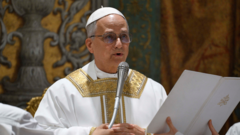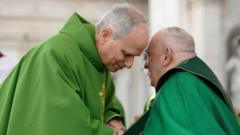Cardinal Robert Francis Prevost has chosen the name Pope Leo XIV, a decision steeped in historical significance that draws upon the legacy of Pope Leo XIII, who led the Catholic Church from 1878 to 1903. Vatican spokesman Matteo Bruni confirmed this connection during a Thursday briefing, emphasizing the conscious choice to link the new pontiff to Leo XIII’s impactful reign during a tumultuous period in history.
Pope Leo XIV: A New Era in the Catholic Church Begins

Pope Leo XIV: A New Era in the Catholic Church Begins
The selection of Cardinal Robert Francis Prevost as Pope Leo XIV signals a thoughtful tribute to Leo XIII, reflecting modern challenges while honoring historical precedents.
Pope Leo XIII is particularly celebrated for his 1891 encyclical "Rerum Novarum," which championed the rights of workers and laid the foundation of the Church's modern social teachings. This encyclical advocated for a balanced approach to capitalism, encouraging a dialogue between labor and capital in light of the emerging socialist movements of the late 19th century. “Leo XIII saw the importance of addressing the needs of workers, aiming to foster a collaborative relationship between the labor force and business owners,” asserts David I. Kertzer, a historian renowned for his insights into the Vatican's influence in modern society.
The name Leo XIV suggests both respect and continuity. As Kertzer elaborates, Leo XIII represents a figure who skillfully bridged pre-modern papacy with contemporary challenges. Robert Orsi, a history expert, echoed this sentiment, noting that the choice may indicate a desire for Pope Leo XIV to tackle pressing social issues with authority and compassion akin to his namesake.
This new selection mirrors the discerning approach of the previous pope, Francis, yet potentially softens its tone, positioning Leo XIV as a moderating force in ongoing socio-economic discussions. Observers anticipate that this papal name could reflect a commitment to addressing the complexities of today's world while drawing inspiration from the Church’s rich past.
The name Leo XIV suggests both respect and continuity. As Kertzer elaborates, Leo XIII represents a figure who skillfully bridged pre-modern papacy with contemporary challenges. Robert Orsi, a history expert, echoed this sentiment, noting that the choice may indicate a desire for Pope Leo XIV to tackle pressing social issues with authority and compassion akin to his namesake.
This new selection mirrors the discerning approach of the previous pope, Francis, yet potentially softens its tone, positioning Leo XIV as a moderating force in ongoing socio-economic discussions. Observers anticipate that this papal name could reflect a commitment to addressing the complexities of today's world while drawing inspiration from the Church’s rich past.




















